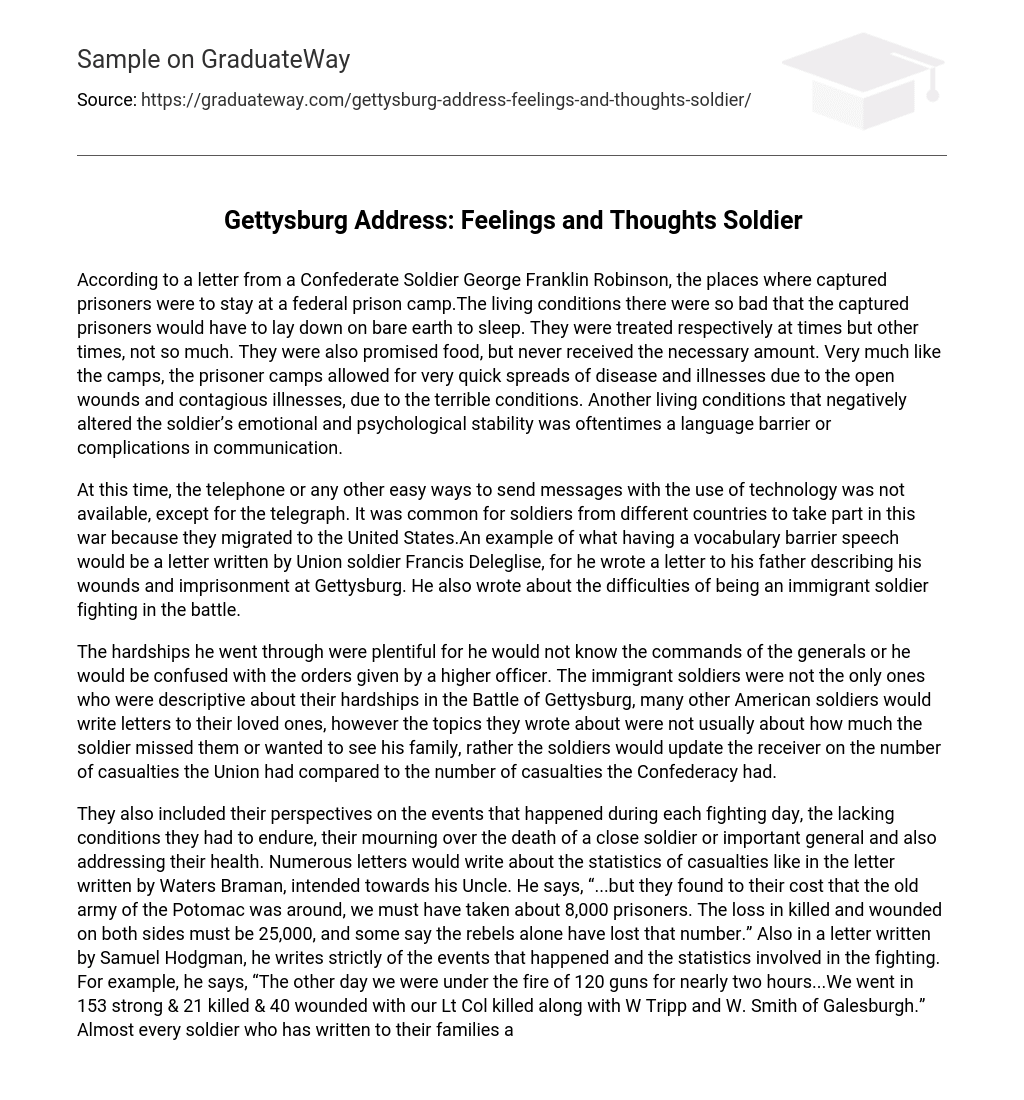According to a letter from a Confederate Soldier George Franklin Robinson, the places where captured prisoners were to stay at a federal prison camp.The living conditions there were so bad that the captured prisoners would have to lay down on bare earth to sleep. They were treated respectively at times but other times, not so much. They were also promised food, but never received the necessary amount. Very much like the camps, the prisoner camps allowed for very quick spreads of disease and illnesses due to the open wounds and contagious illnesses, due to the terrible conditions. Another living conditions that negatively altered the soldier’s emotional and psychological stability was oftentimes a language barrier or complications in communication.
At this time, the telephone or any other easy ways to send messages with the use of technology was not available, except for the telegraph. It was common for soldiers from different countries to take part in this war because they migrated to the United States.An example of what having a vocabulary barrier speech would be a letter written by Union soldier Francis Deleglise, for he wrote a letter to his father describing his wounds and imprisonment at Gettysburg. He also wrote about the difficulties of being an immigrant soldier fighting in the battle.
The hardships he went through were plentiful for he would not know the commands of the generals or he would be confused with the orders given by a higher officer. The immigrant soldiers were not the only ones who were descriptive about their hardships in the Battle of Gettysburg, many other American soldiers would write letters to their loved ones, however the topics they wrote about were not usually about how much the soldier missed them or wanted to see his family, rather the soldiers would update the receiver on the number of casualties the Union had compared to the number of casualties the Confederacy had.
They also included their perspectives on the events that happened during each fighting day, the lacking conditions they had to endure, their mourning over the death of a close soldier or important general and also addressing their health. Numerous letters would write about the statistics of casualties like in the letter written by Waters Braman, intended towards his Uncle. He says, “…but they found to their cost that the old army of the Potomac was around, we must have taken about 8,000 prisoners. The loss in killed and wounded on both sides must be 25,000, and some say the rebels alone have lost that number.” Also in a letter written by Samuel Hodgman, he writes strictly of the events that happened and the statistics involved in the fighting. For example, he says, “The other day we were under the fire of 120 guns for nearly two hours…We went in 153 strong & 21 killed & 40 wounded with our Lt Col killed along with W Tripp and W. Smith of Galesburgh.” Almost every soldier who has written to their families always update them on the number of casualties both sides had showing the mindset of the soldiers during war.
The perspectives the soldiers had of the war are essential when looking at their emotional and psychological instability. Also included in the letters, soldiers would write about the experiences and thoughts they had while fighting the war and the outcome of the daily fighting. For example, a Scottish-born Canadian citizen enlisted in the Union army and wrote a letter to his family detailing his experiences during the war. At first, their spirits were high, but as they got to know the casualties of the soldiers and generals, they became more and more depressed and exposed to morals of war and battle. Before fighting, the soldiers were very passionate about the cause they fought for. Spirits were high even when they knew the stakes.
The stakes being their own lives. After and during fighting, they were exposed to the immense amount of deaths and casualties on both sides of the battle from soldiers to generals, and were now scarred by the deaths of fellow soldiers. The sodliers would very often express this in letters to loved ones. Matters would be even worse when a soldier would get wounded because the soldiers would be admitted into hospitals such as the Ward A. West building Hopsital in Baltimore. The soldiers would often share their injuries to loved ones through letters, being as graphic and honest as possible, however telling them they are or were getting treated and that their wound isn’t affecting them badly anymore. Many amputations took place due to shots to a limb. With this came more included statistics on the number of wounded and broken bones of soldiers in the letters. The physical conditions while fighting were often in an open field with many barricades and the soldiers would use bayonets as their main guns and were determined to never “retreat one inch from the line as long as they could use bullets or bayonets.” Soldiers progressively got weaker because of sicknesses, previous injuries, and lack of nutrition and diet in their bodies and also because the fighting would last around 3-5 hours.
In addition, the emergence of included statistics on the number of deaths in the letters were a very common notice along with addition of the number of casualties and injuries of soldiers and generals to update the letter’s recipient. The soldiers would also include the people they fought for example, John Futch had to battle his brother because they had opposing views on the sides of the Civil War. He wrote about his brother in a letter to his wife and the psycholgogical impacts that he had on his mental state being. He would include in the letter, signs of deep depression because he had fought his immediate family member.
The emotional and psychological instability is due to all the facts and unstable living conditions of the camps during the battle of Gettysburg.





